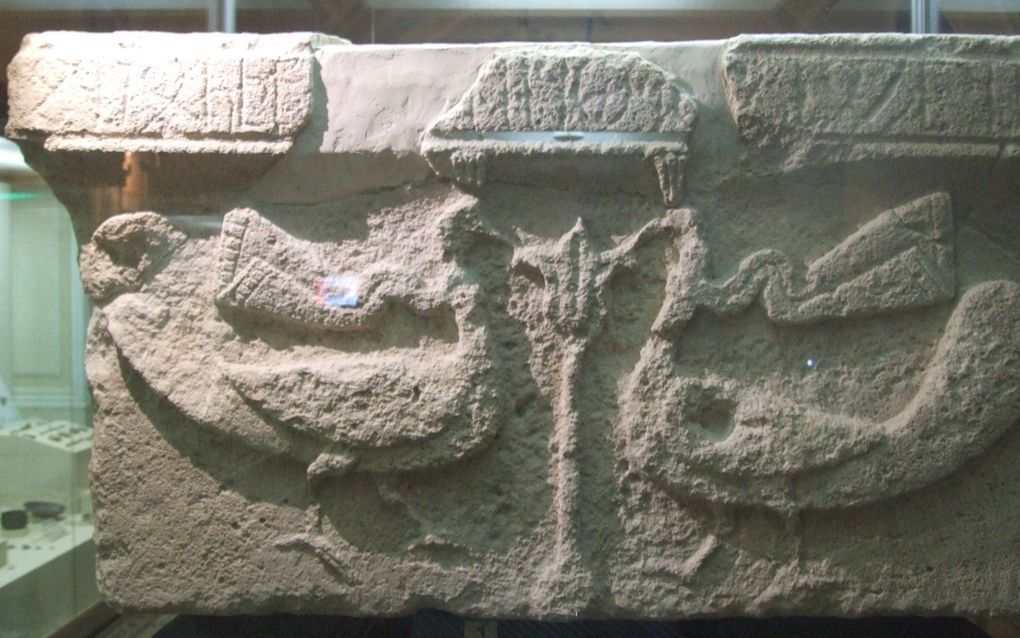Small Christian community in Caucasus used as propaganda weapon
10-08-2021
Eastern Europe
Martin Janssen, RD

A column capital with an Albanian inscription from a 7th-century church in the town of Mingachevir in Azerbaijan. Photo Wikimedia
Eastern Europe
A Christian community in the Caucasus was thought to be lost until recently. However, due to the attention of political leaders in the region, the community is suddenly in the spotlight again.
Last year, Azerbaijan won a victory over Armenia in the war over the enclave of Nagorno-Karabakh. Since the end of this war, both politicians and academics in Azerbaijan have turned their attention to an obscure group long believed to be extinct: the Caucasian Albanians.
An ancient kingdom
The Albania in question was an ancient kingdom in the Caucasus located in the present-day Republic of Azerbaijan. Like its neighbours Georgia and Armenia, the Albanians adopted Christianity in the fourth century. In the ninth century, however, they disappeared as a result of Arab conquests.
There are theories that they were entirely absorbed by the Turkish, Armenian and Georgian peoples. However, there was a small group of these Albanian Christians who refused to assimilate. They are called the Udi Christians. According to conservative estimates, there are still some 10,000 Udi living today, especially in Azerbaijan.
A new version of history
Politicians in Azerbaijan, including President Ilham Aliyev, are currently paying particular attention to these Albanian Christians, especially the Udi. The official theory is that the inhabitants of present-day Azerbaijan were Turkish nomads, Muslim conquerors. However, an entirely different version is currently being put forward. The inhabitants of present-day Azerbaijan are said to be the descendants of these Christian Albanians. In other words, they are indigenous, just like the inhabitants of neighbouring Armenia and Georgia.
Up to this point, it seems a reasonably innocent issue, but the devil is in the follow-up. Azerbaijan now claims that the Armenians were brought to this region in the 19th century by Tsarist Russia. With Russian help, the Armenian Apostolic Church is said to have confiscated the churches of the Albanian Christians. The Armenian Apostolic Church is said to have added inscriptions and changed the architecture of these churches to disguise their Albanian origin.
This also applies to the Armenian churches in Nagorno-Karabakh. They are said to have originally belonged to the Albanian Christians living in present-day Azerbaijan.
Focus of propaganda war
In a speech on 25 November last year, President Ilham Aliyev said that “Armenian historians had falsified these ancient Albanian churches. They have appropriated these churches.” The Udi Christians have unwittingly become the focus of this propaganda war. Encouraged by Azerbaijan, the idea of re-establishing an Albanian Church arose within the community of Udi Christians. Robert Mobili is an important religious leader within the Udi community. His speeches match the rhetoric of Azerbaijani politicians. For example, in an interview in October last year, he claimed that “the restoration of the Albanian Apostolic Church will be the biggest blow the Armenians will receive.”
Since the end of the war in Nagorno-Karabakh late last year, Robert Mobili has visited several Armenian churches in this disputed enclave, sometimes in the company of President Aliyev. These Armenian churches are said to be de facto Albanian churches. This would also apply to churches and monasteries in both Georgia and Armenia.
This article was published previously in the Dutch Reformatorisch Dagblad on August 9th 2021.


